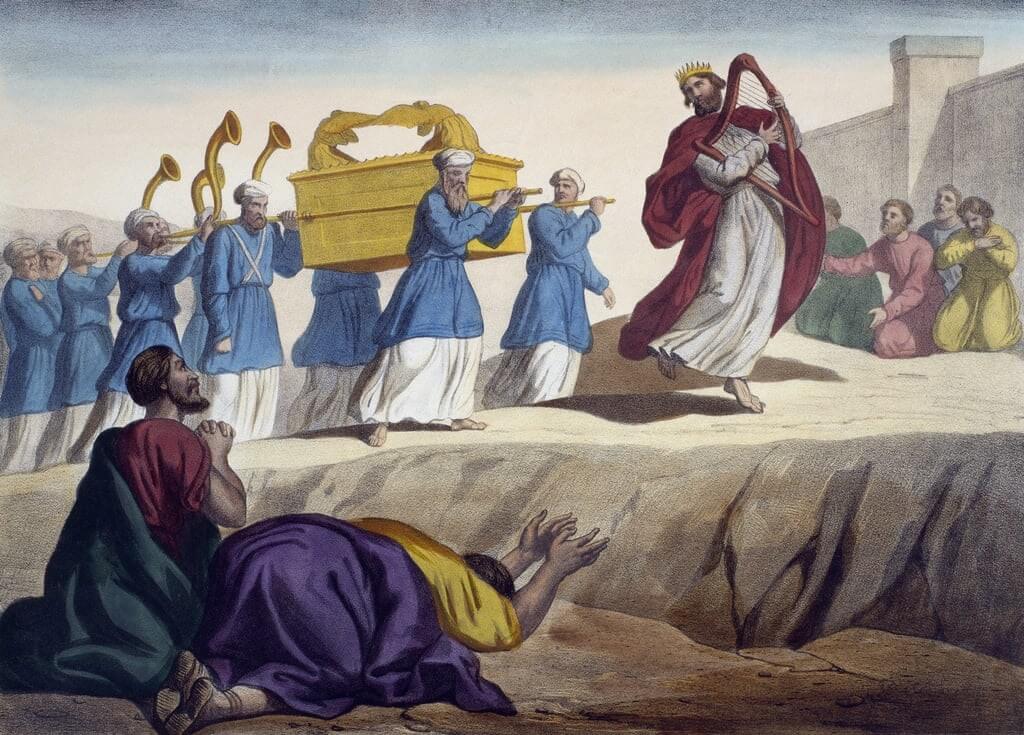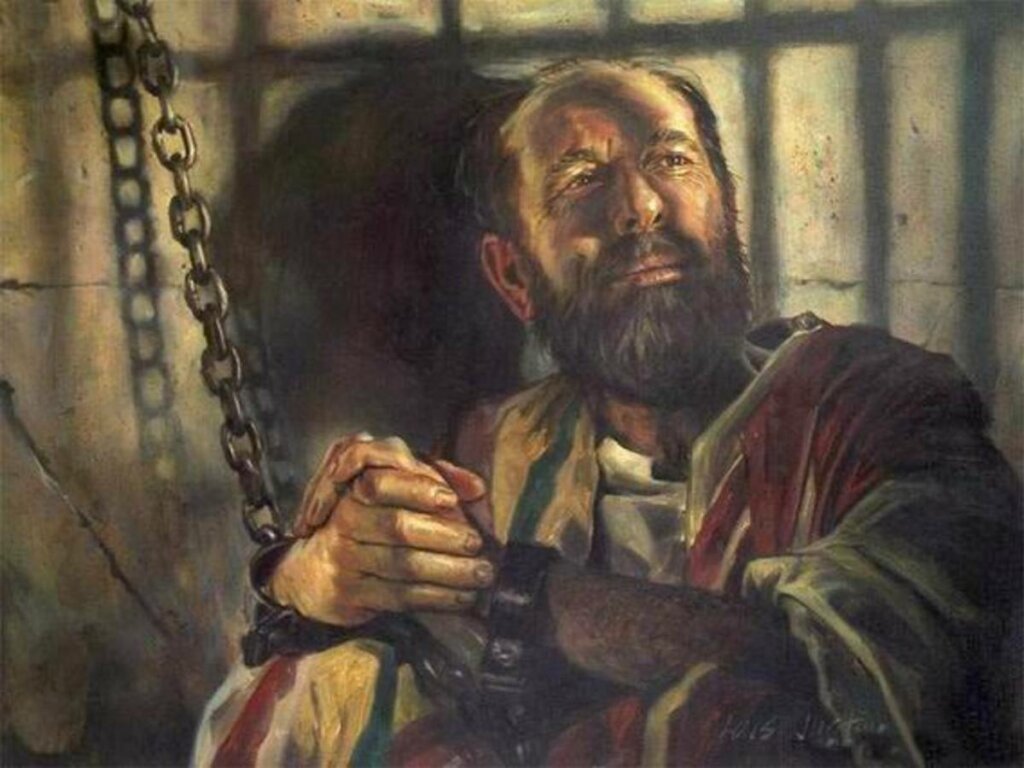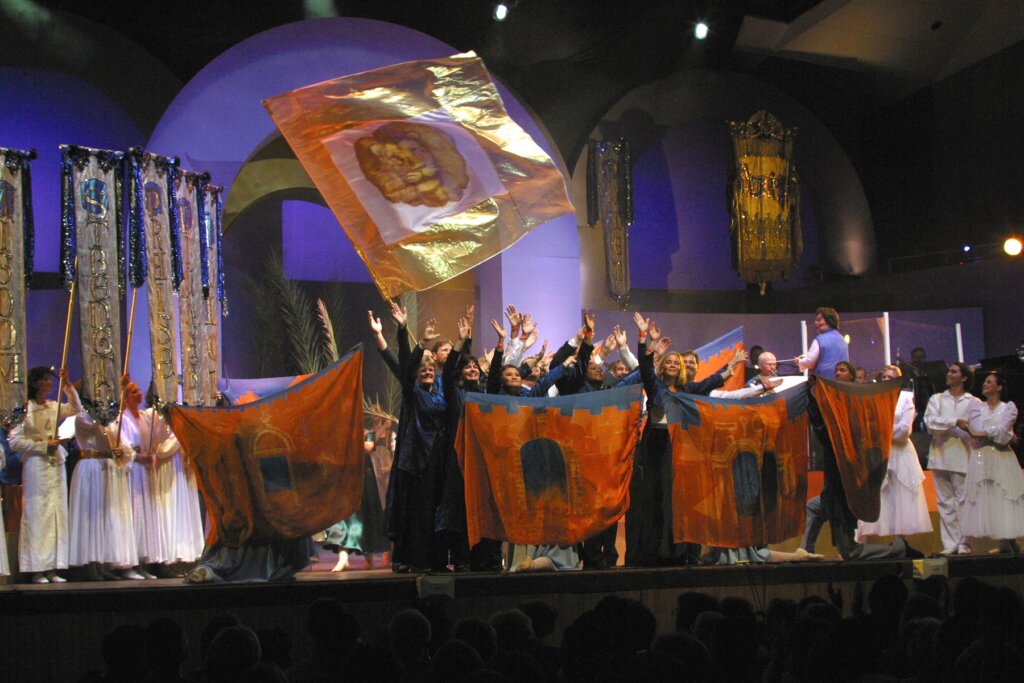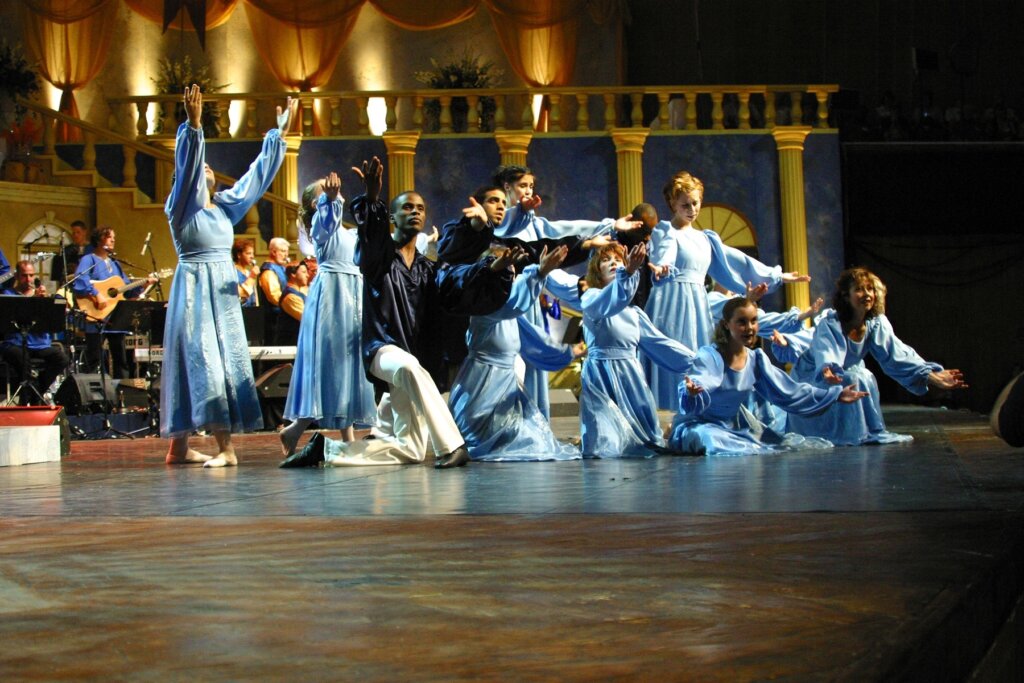
Heaven Reigns!
Published on: 4.9.2023The Lord is ‘King of all the Earth’
By: Dr. Jürgen Bühler, ICEJ President
This year’s Feast theme is taken from the book of Psalms, where the sons of Korah declare: “For God is the King of all the earth; sing praises with understanding.” (Psalm 47:7) This bold proclamation is also found earlier in this so-called “enthronement psalm”, when the writer declares: “For the Lord, the Most High, is to be feared, a great king over all the earth.” (Psalm 47:2 – ESV throughout )

For both Jewish and Christian interpreters, verse 5 is a key to understanding the context of this royal Psalm. “God has gone up with a shout, the Lord with the sound of a trumpet.” (Psalm 47:5) Jewish commentators consider the phrase “God has gone up” to be a reference to the story of King David bringing the Ark of the Covenant from Obed-Edom’s home in Kiriath-Jearim, a village close to today’s Abu Gosh on the western ascent to Jerusalem (see 1 Chronicles 15). The Lord is enthroned upon the cherubim covering the Ark (2 Samuel 6:2; Psalm 99:1; etc.), and made His way to Jerusalem, the place that He chose as a habitation out of all the tribes and where He put His name (Deuteronomy 12:5).
Jerusalem became the place which was not only the capital of David, King of Israel, but there also the Lord was enthroned as King of the whole earth. Therefore, the psalmist also commands: “Sing praises to the Lord, who sits enthroned in Zion.” (Psalm 9:11)
Amazingly, it was especially during the time of Israel’s greatest king that God received the greatest worship as King of Israel and even to the ends of the earth. Unlike King Saul, David was fully aware that his own kingship was totally dependent of the Kingship of God. Therefore, some of the most beautiful Psalms declaring God as the sovereign King of Israel were written either by David or by worship leaders he appointed. David understood the greater he exalted the Kingship of God, the more he could expect God’s faithful hand during his own reign.
It is of no surprise then that some of the most powerful proclamations of God’s Kingship can be found in the book of Psalms. Some forty Psalms declare Him as the supreme ruler, fully enthroned, as King of the entire earth (Psalm 47), and in heaven (Psalm 11:4), over Jacob (Psalm 59:13), and over the nations (Psalm 22:28). The Psalmists understood that this King, who is also exalted as Creator of heaven and earth, is in full control over the affairs of this world.
Even in hostile times, when the enemy seems to have gained full control over God’s people and come in like a flood, men of God understood that this would not change one bit the sovereign Kingship of God. That is why the prophet Daniel, even in the most hostile culture of Babylon and while serving in exile a king who had just destroyed the holy city and the Temple, could declare that his God “… changes times and seasons; he removes kings and sets up kings; he gives wisdom to the wise and knowledge to those who have understanding” (Daniel 2:21). Even in captivity and amidst the most adverse circumstances, it would not change the fact that God was fully enthroned and in control. Serving as prime minister to the Gentile ruler Nebuchadnezzar, Daniel announced judgement to this perceived ruler of the world. God would judge Nebuchadnezzar until he recognised that “Heaven rules!” (Daniel 4:26); and indeed, that “the Most High rules the kingdom of men and gives it to whom he will.” (Daniel 4:32)
This same Psalm 47 also has a rich Christian tradition. Since the time of the Reformation, the proclamation “God has gone up with a shout” is read on Ascension Day. Martin Luther titled this Psalm: “Christ ascended to Heaven, of the sons of Korah.” The early Apostles also saw the risen Christ as seated at the right hand of the Father. In Paul’s letter to the Ephesians, he describes this concept in a most wonderful way, namely that God “… raised him from the dead and seated him at his right hand in the heavenly places, far above all rule and authority and power and dominion, and above every name that is named, not only in this age but also in the one to come. And he put all things under his feet and gave him as head over all things to the church, which is his body, the fullness of him who fills all in all.” (Ephesians 1:20-23)
That means there is nothing left out that is not subject to Christ’s rule. His reign transcends above every poser that might manifest itself on earth. Christ is risen above all adversaries. And Paul affirms to the Ephesian church that this heavenly realm is exactly where the believer is seated already now in Christ (Ephesians 2:6).
This kingdom reign of Christ, however, manifests itself in ways that contradict human expectations. It was not a ‘rule all’ and ‘claim all’ approach for the early Apostles. On the contrary! Yes, it was God who always led them to triumph in Christ (2 Corinthians 2:14). But at the same time, Peter and Paul and James could also rejoice in various adversities, including imprisonment. They could see, on the one hand, Christ the King sitting high and lifted up while in the cold prison cells of distant Roman provinces. Yet they also knew His rule when they witnessed the power of God at work as in Ephesus, where God’s Kingdom manifested with unusual miracles, healings, signs and wonders (Acts 19:11-12).

Being confined to a prison cell was no contradiction to them when they also saw the Kingdom of God in operation while preaching the pure Gospel of the Kingdom. Rather, it was part and parcel of Kingdom life. To the Thessalonian believers, Paul even declared their present time of suffering was proof that they had been found “worthy of the Kingdom” (2 Thessalonians 1:5).
In his introduction to the Book of Revelation, the Apostle John places this tension in full view: “I, John, your brother and partner in the tribulation and the kingdom and the patient endurance that are in Jesus, was on the island called Patmos on account of the word of God and the testimony of Jesus.” (Revelation 1:9) His partnership was both in the Kingdom and in tribulation.
John further saw the Kingdom of God in full completion at the very end of his great vision. God is dwelling with men. The Bride of the Lamb is a glorified city of Jerusalem coming down from heaven as the Lord wipes away every tear. The early Church fathers all hoped for this great future manifestation of God’s Kingdom. And what they experienced in their respective lives and times was a mere taste “of the powers of the age to come” (Hebrews 6:5). In their spirits they were already seated with Christ in heavenly places, yet at the same time they were still here in a troubled world full of trauma and drama.
And as they waited for the King to come, they also expected Jesus “to restore the kingdom to Israel” (Acts 1:6). The reason was simple, as they found countless passages which spoke of a restored Kingdom for Israel like that which they had under King David:
“Behold, the days are coming, declares the Lord, when I will raise up for David a righteous Branch, and he shall reign as king and deal wisely, and shall execute justice and righteousness in the land. In his days Judah will be saved, and Israel will dwell securely. And this is the name by which he will be called: ‘The Lord is our righteousness.’” (Jeremiah 23:5-6)
Today’s restoration of the modern state of Israel is thus nothing less than God building His platform for a full restoration of His kingdom for Israel, to which the King of Kings will soon return. This is the restored Kingdom which the early disciples longed for. And it is why the annual Jerusalem March during the Feast of Tabernacles is not just a solidarity march for the state of Israel, but also a prophetic manifestation of the nations coming up to Jerusalem in recognition of the Lordship of the King of the Jews over their lives. This all means that God encourages us to hope for a great future Kingdom, the ultimate hope and goal of our faith.
Still, God expects us to live out the heavenly Kingdom reality in the here and now. The theologian George Eldon Ladd captured this reality in the title of his book, “The Presence of the Future.” The task at hand is for us to overcome the challenges of today, or to conquer today, as some translations put it. While we do not yet live in a perfect world, God expects us to live out his Kingdom reality in this present darkness, just as Daniel did in the midst of an evil Babylonian system. Daniel saw the King high and lifted up, and believed in Him even though he lived through some of the most difficult hours of Jewish history.

For this reason, the Feast theme this year sets our eyes on the eternal Kingship of Jesus. We are living in a world with unprecedented challenges. In many nations, the biblical values of family, gender and personal identity are under severe attack. The pressuriser of the global LGBTQ movement has already been allowed to enter the gates of far too many churches.
In addition, we are facing an unparalleled effort by a global elite to control the world which made a quantum leap in that direction during the recent coronavirus pandemic. Even now, the World Health Organisation is passing new laws which seek to override the sovereignty of individual nation-states.

An even newer and rapidly growing threat is Artificial Intelligence. Man-made and even computer-generated algorithms will soon not only make critical decisions in hospital operating rooms, but they also will drive our cars. Ominously, in some war zones AI is already making life-and-death decisions over human lives. Sure, in many ways AI will improve the daily lives of many people and can possibly even save lives. But there already is a dark side to it. The Israeli philosopher Yuval Noah Harari recently suggested to have AI write a new holy book that will replace not only the Bible but the holy books of all world religions, to establish one truth accepted by all.
At the same time, antisemitism and anti-Israelism are on the rise in most post-Christian countries. Some are using the World Court of Justice to paint Israel as an Apartheid state, which will lead to more boycotts and saddle Israel with a pariah status. In addition, other global challenges, such as growing inflation rates, are serious causes for concern even among many believers.
The message in the midst of this chaos is the same for us today as it was in the times of Korah the Psalm writer or Daniel in Babylon: The Lord reigns! Yes, Heaven reigns! Our Lord is a great King over all the earth!
God expects us to not just wait for the future glory of His coming, but to work in building His Kingdom until He comes to take up His earthly throne. That is why the Book of Revelation writes this about the future inhabitants of the New Jerusalem: “The one who conquers will have this heritage, and I will be his God and he will be my son.” (Revelation 21:7) The question we all must ask ourselves is: How are we doing in overcoming and conquering in our dark times. God is looking for those who will stand in the gap in prayer for their chaotic nations. He wants to hear you ask Him and He will give you nations as an inheritance (Psalm 2:8). He wants us to push the battle back at the gate and conquer the land that He promised us as an inheritance.
As we do this, we can join in the praises of the great coronation. Psalms 93 to 99 were written in equally challenging times and still declared: “The Lord reigns, let the earth rejoice!” (Psalm 97:1); “Say among the nations ‘The Lord reigns!’” (Psalm 96:10); “All the ends of the earth have seen the salvation of our God.” (Psalm 98:3)

This year, we will have in a very literal sense “all the ends of the earth” at the Feast of Tabernacles. They will come to Jerusalem and make a joyful noise before their God and King. They will come from the most northern parts of the earth, from the Arctic regions of Norway, Finland and Russia. They will come from the southern-most tips of the continents in Argentina and South Africa. They will come from the most distant isles afar off, from Fiji, Tonga and the Solomon Islands. God’s Kingdom rule has extended to all these remote regions of the world and now they are coming to the city of the great King, to pledge afresh their devotion to the King of Kings, to Yeshua our Saviour.
No matter how great your challenges are in your nation, remember that Heaven rules! No matter how great the mountains of adversity or the impossibility of your situation, tell them “Who are you, O great mountain? Before Zerubbabel [before Jesus] you shall become a plain.” (Zechariah 4:7).
Let us join together to conquer, to overcome together, and to live out together the purpose of Messiah in redeeming souls and destroying the works of the enemy. Let us carry out great exploits until He comes. May the Lord bless you from Zion as you do so! The Lord reigns!